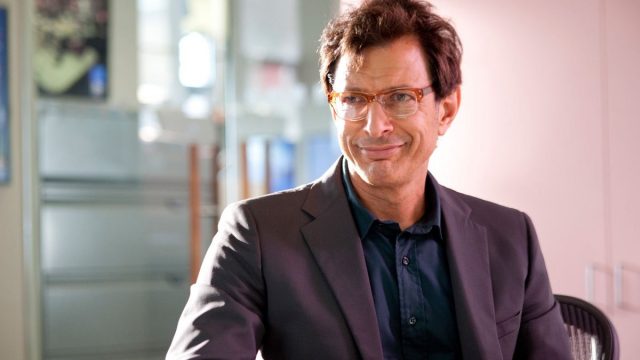I actually like the enjoyable fluff that is Morning Glory (2010). Casting Rachel McAdams as a frenzied, endlessly perky morning show producer goes a long way to convincing me that there’s both genuine drive and genuine intelligence under all that sunshine; casting Harrison Ford as a guy who used to do good work and who now mostly pissily phones it in is… appropriate enough. And as a behind-the-scenes look at a quasi-newsroom, it’s more realistic, and therefore both more depressing and more optimistic, than Sorkin’s The Newsroom, and much more interested in how people actually get work done. But the one thing I really preserve from it is a single Jeff Goldblum moment.
Goldblum’s slightly off-beat charisma is a natural scene-stealer anyway. But there’s a beat in Morning Glory where his network executive has to acknowledge that McAdams has done the impossible and turned his flagging, long-time joke of a show into something that’s attracting national attention. He recruited her for this, but it’s no longer a personal victory for him, because he’d long since stopped believing in her. And in this one scene, Goldblum expresses not regret at knowing a talented employee is going to slip away, not professional respect, not wry resignation, but… a kind of melancholy heartbreak that instantly convinces me that his character has fallen in love with McAdams’s. I doubt this is deliberate on the movie’s part, but it’s a great moment: the intrusion of something raw, accidental, and tragic into a movie that’s otherwise about polish and pep. It casts a long shadow, and it’s what I’ll remember about the movie long after I’ve forgotten everything else.
Sometimes it’s a moment, a twist, or a performance. Sometimes it’s a line of dialogue–“Anytime you try a decent crime, you got fifty ways you’re gonna fuck it up. If you can think of twenty-five of them, you’re a genius. And you ain’t no genius”–or a particular shot or visual style. A song or score–“In-a-Gadda-da-Vida” in Manhunter. Or, strangest and most specific of all, a single detail, like the recommendation of Noel Streatfeild’s Shoes books in the movie You’ve Got Mail.
What are some unusual bits of a movie that you’ve held onto even after the rest has become vague?


